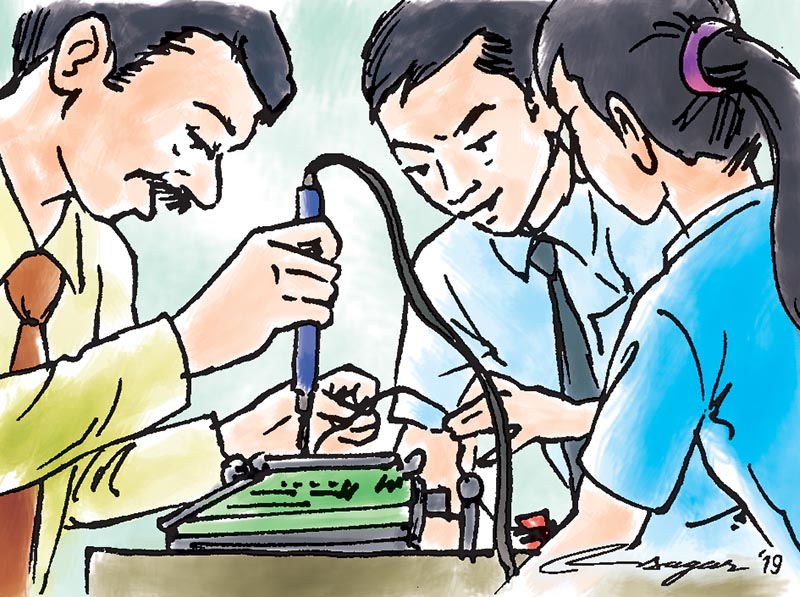Vocational education: More suitable for Nepal
Technical education upgrades an individual’s skills and supports each and every individual, society and the whole nation to move ahead on the path of self-reliance
Education is the identity of each and every civilised citizen in society. It is the backbone of economic development of any country. Normally, education can be divided into two categories. One is formal, or theoretical education, and the other is technical, or vocational education. In the present global context, technical education is considered to be more relevant and pragmatic than theoretical one.
In Nepal’s context, technical or vocational education, is considered to be more beneficial and relevant than formal or theoretical education. This is because technical or vocational education is skill-oriented while theoretical education is less relevant from the point of view of employment opportunities and income-generating activities. Needless to say that lack of adequate vocational and skilled education is the primary cause behind the rising unemployment situation in our country.
It is a common practice for any country to provide education in line with the need and demand of the day. Because an absence of proper skills, awareness and orientation about an appropriate job and inadequate information and counselling are the main reasons behind unemployment. So mere concentration on theoretical education is likely to create educational unemployment in the society. In this regard, we need an education model that stimulates economic growth and leads to the path of self-reliance. Obviously, technical education upgrades an individual’s skills and supports each and every individual, society and the whole nation to move ahead on the path of self-reliance. It is, therefore, imperative that vocational training and skill development programmes be made more accessible to the people of every nook and corner of the country.
Talking about the significance of technical education in the country, it may be recalled here that the New Education Plan was initially introduced in the country in 1971 with a view to enhancing technical and vocational education in the country. But due to lack of strong political commitment of the government, the policy could not be implemented fully and failed miserably. Now there is growing public concern over the relevance and significance of technical and vocational education in the country. It is obvious that any individual or citizen with technical education and skills can make significant contribution to economic progress and help eradicate the existing poverty and unemployment situation in the country.
Nepal currently faces an acute shortage of skilled and semi-skilled manpower in the construction and development activities, especially after the devastating earthquake of 2015. So it is necessary to focus attention by the concerned authorities on changing the traditional attitude towards education and create a sound environment for adopting a job-oriented education model in the society.
Against this background, the Council for Technical Education and Vocational Training (CTEVT) has a crucial role to play in producing such skilled and job-oriented manpower. CTEVT is apparently the sole national institution imparting and coordinating technical and vocational education in the country. With this line or objective, CTEVT currently is imparting technical education and vocational training to produce medium or semi-skilled manpower in the country. This institution conducts short and long-term training programmes in different technical fields, based on the courses it has designed, to produce health assistants, junior agriculture and veterinary science assistants, pharmacists, lab technicians, electricians, mechanics, plumbers, computer operators and human resource for the hotel industry.
The Council has also given priority to imparting technical education to those who are socially backward, such as women, disabled, poor, Dalits, ethnic minorities and to those who live in remote areas and are deprived of resources and facilities. And it is also learnt that CTEVT is currently working for the promotion and preservation of traditional and indigenous technologies. However, CTEVT has, on some occasions, been publicly criticised for not producing competent or skilled manpower. So CTEVT is advised to pay attention on producing quality manpower in the country.
According to a recent study, every year, three to four hundred thousand youngsters enter the labour market. And at the same time, annually unemployment is increasing at the rate of 4 per cent in the country. This will obviously invite further socio-economic problems in the country. So it is necessary to expand technical and vocational education in the remote areas of the country so that we can curb the widely existing problem of poverty and unemployment in the country. At the same time, it has also been realised that rules and regulations must be enforced to impart basic skills training under a single umbrella to the labourers who leave for the Gulf and other labour destinations. Due to lack of proper skills and training, Nepali workers have no option but to do low-paying, hazardous, menial work abroad.
Thus technical and vocational education is important and relevant for a poor and economically backward country like Nepal. Indeed, it is technical and vocational education that can make significant contributions to lead the country towards the path of self-reliance.
KC is president of Guardian Association of Blind-Nepal






